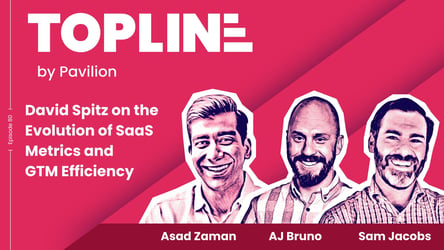Jason Lemkin, Investor & Founder Chairman at SaaStr, joins the show to discuss investing, valuations, interest rates, and the challenges the SaaS industry faces heading into 2024.
Listen to new episodes of the Topline podcast on Spotify, Apple, or iHeart every Monday.
Let's dive into this episode's key topics…
The AI Bubble
Watch here
- In 2020 and 2021, we saw tech companies raising a lot of capital, and beginning in 2022, we saw a decline in performance leading everyone to believe that these organizations have been overvalued.
- There’s concern that valuation trends seemed to mimic previous market bubbles. Despite what we've seen post-2020/2021, there has been a surge in AI investments, with AI companies at the infrastructure layer hitting a hundred times valuations at early funding stages.
- There are worries over the persistence of low public multiples. Companies and investors aren’t accustomed to valuations around six times profits. This is a level that hasn't been commonly encountered since 2017-2018.
- The additional concern is that if this continues, it could place undue stress on the system, hence affecting investment efficiency and productivity in the long run.
A Continued Conversation on Automating Customer Success
Watch here
- On last week’s episode, we discussed how the Snowflake CRO in a podcast recently expressed that he does not believe in the necessity of a CS team, dismissing all CS personnel. Freeing up the budget, which was then directed into four main areas – hiring more salespeople, more sales engineers, professional services personnel, and creating a business value engineering team. Also, giving salespeople a renewal target.
- Undeniably, there is a need for a transformative CS strategy. We are in the era of efficiency – as a 10% QBR attendance is no longer adequate for achieving a 140% net revenue retention.
- The general sense is that most VPs of Sales want to fully automate CS. However, we need to consider the impact this will have on the customer experience, including the fact that customers want to know that their feedback is heard and understood.
- If there is skin in the game for the AE, AEs owning account support is more effective than poor CS and still offers support from a human post-purchase. However, you’ll never have the level of attention dedicated to customers’ happiness if support is under AEs, whose primary focus will always be new business.
Building Board Relationships
Watch here
- During the hot market phase, founders welcomed crossover funds like Tiger Global, providing funding with minimal expectations and no board seats. However, when the market shifted, these investors became less involved, causing stress for founders. Board relationships have become a significant concern as investors spend less time in the market.
- Transparency between investors and founders is essential. Regularly ask two crucial questions at the end of board meetings: "Scale 1-10: How am I performing?" and "Yes or No: Would you provide additional funding if needed?"
- Check out Brian Hallagan’s LinkedIn post on building boards here.




